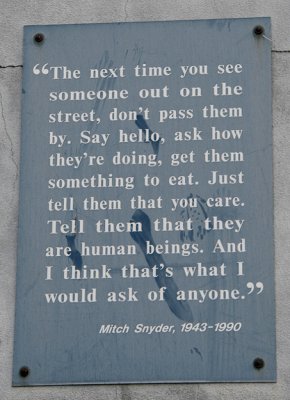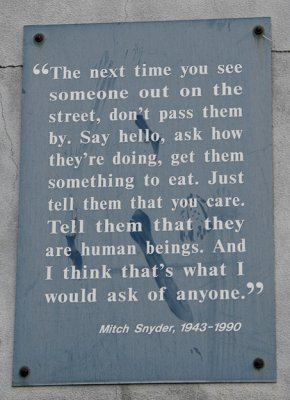
Eric Sheptock once revealed a thing that some people experiencing homelessness have found. On a special day, there can be too much bounty. In certain cities, it would be theoretically possible for a person to have several Thanksgiving dinners at different venues, and the donating organizations would still have food left over.
Earlier this month, journalist Jordan Schatz interviewed Sheptock and elicited what are, in his view, the five leading causes of homelessness:
… a lack of affordable housing, a lack of a living wage, domestic violence, medical bankruptcy and mental illness.
Sheptock is one of 1,350 residents of the Community for Creative Non-Violence, which is a stone’s throw away from the Department of Labor. The reporter quotes him as saying,
In spite of how close they are, the Department of Labor has never walked across the road to enter the shelter and ask the people in there how they can help them get any work. One of the biggest causes of homelessness is the lack of employment and the lack of a living wage. You’d think [the Department of Labor] would walk across the road and say, how can we help you to get employed?
Schatz must be thanked for reminding us of the history of the Community for Creative Non-Violence, which was created by Vietnam veterans as a tangible statement of their renunciation of violence as a solution to anything. Back in the early 1980s, hundreds of people were informally living in the building.
Sheptock is again quoted:
The feds came to remove the homeless and a guy named Mitch Snyder organized the homeless and went on a hunger strike, and they got the building from the Reagan administration. Mitch Snyder and Ronald Reagan signed a restrictive covenant to keep that building a shelter from 1988 to 2018, and it’s actually one of the best shelters in the city.
So, getting back to Thanksgiving, could a person be blamed for taking part in every banquet that extends an invitation? There must be a strong temptation to absorb as much nutrition as possible. Unfortunately, the human body doesn’t function well on a feast-and-famine cycle. Over-nourishment on one day doesn’t really do much long-term good for the system.
If a homeless person owned a nice set of plastic containers, a refrigerator, and electricity to run the refrigerator, holidays would be great. If a person waited until everyone had been served, and then asked the staff of the shelter or church for some leftovers to take away, and had a place to store food, these seasonal gifts would stretch farther, and holiday sharing could get more bang for its buck. But, of course, no refrigerator is available.

If there is a little extra at some holiday meal-sharing events, let no one interpret that as a reason to give less. Even if abundance exists in some places on a few days per year, it might not be that way in your town. Almost everywhere, the current holiday season is bound to be more needful than the last.
Thanksgiving is a day fraught with emotional traps and traumas even for people lucky enough to be housed and/or employed. Imagine how it feels to be homeless on Thanksgiving. Imagine that you want to help, but your own finances are pretty well tapped out, and you may even feel in danger of becoming homeless yourself.
When facing the evidence of homelessness, the housed citizen’s psyche becomes a battleground of warring emotions, as expressed in a poem by Eric Lawson. Out of hopeless frustration, the poet asks,
I am just one man… How do I help others when I cannot even help myself?
Now, imagine that there is a way to help others, and possibly even do one’s own self some good, and it doesn’t even cost a cent. Please become acquainted with the Universal Living Wage and sign the petition.
Reactions?
Source: “Sheptock: Homeless because of no jobs; jobless because of no home,” DC Spotlight, 11/02/11
Source: “Peripheral Vignettes,” theericlawson.blogspot.com, 04/25/11
Image by dbking, used under its Creative Commons license.


